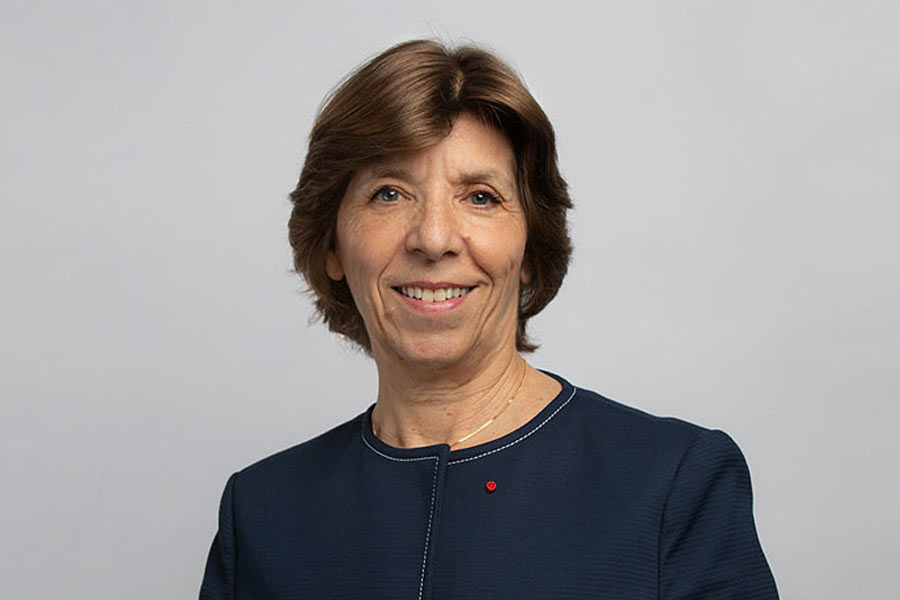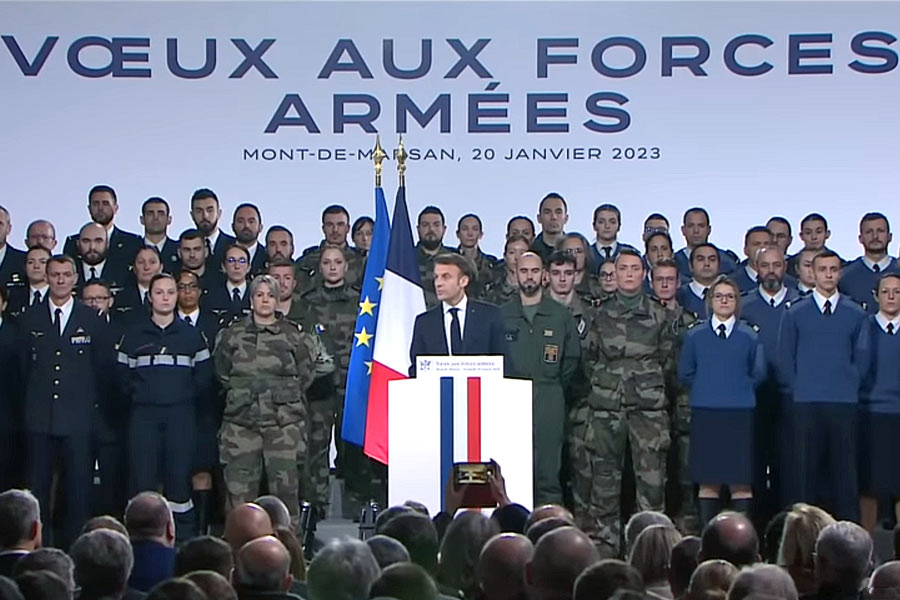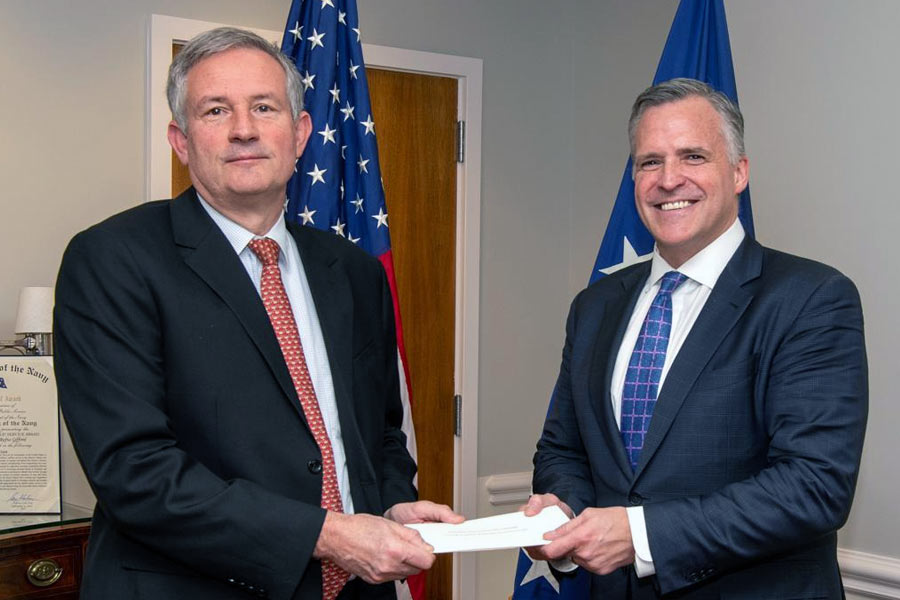New Year greetings to the diplomatic corps
New Year greetings to the diplomatic corps
New Year greetings to the diplomatic corps
SUMMARY
Speech by Ms. Catherine Colonna, Minister for Europe and Foreign Affairs to the Diplomatic Corps (excerpts)
• Hopes and challenges for 2023
• Diplomacy and truth
• Ukraine
• Climate
• Diplomatic security and consular rights
• Iran
• French policy in 2023

Metadata
Release date: January 16, 2023
Tag(s): Diplomacy, Foreign policy

Metadata
Release date: January 16, 2023
Tag(s): Diplomacy, Foreign policy
(…)
HOPES AND CHALLENGES FOR 2023
As 2023 begins, I wanted above all to wish you health and happiness, for yourselves and your loved ones. I also want to send my warm wishes to your teams, without whom we’d be nothing, and your countries. And like you, Your Excellency, I hope this year we can more effectively ensure that the law is respected and make progress on the path of peace, justice and fraternity.
For we’ve emerged from a 2022 that saw too many crises and tragedies. The field of confrontation widened. And this clear observation belies a multitude of human dramas, suffering, broken lives and injustices.
We’re seeing it the world over, but also on this continent, because for the first time since 1945 war has returned to the European continent. Russia chose to bring war back to our continent on February 24, 2022. But we’re also seeing it in the resurgence of tensions elsewhere, between Armenia and Azerbaijan. We’re seeing it in Africa. We’re seeing it in the Middle East, but also in Iran and Latin America. We’re seeing it in Asia. (…)
All over the world, the law-based international order enabling us to live together is being challenged. The voice of the people isn’t always listened to. Crises are proliferating and the risk of the world fragmenting is very real. And it’s all the more serious, all the more regrettable, because we’re facing increasingly significant global challenges affecting all our futures, and we know it. And these challenges demand increased cooperation between everyone. And so, at a time when we should be together, acting together, we’re moving apart.
The climate emergency hasn’t waited for us. Food insecurity has worsened, particularly due to the Russian aggression in Ukraine. The growing pressure on natural resources is increasing the risk of new tensions emerging everywhere. The pandemic itself, which since 2020 has prevented us from holding these New Year greetings ceremonies, hasn’t totally disappeared. The virus is putting some countries to the test once again. And all these issues – and I could mention others – demand more cooperation and not more rivalries or self-interest.
So I hope, and I’m not being naïve, that 2023 will be the year when diplomacy makes a comeback, that we’ll all work together even more effectively to maintain and develop the spaces for dialogue and cooperation that are the only way to restore peace and stability. Sometimes it works. I saw it a few days ago in Ethiopia, which I visited with my German counterpart, Annalena Baerbock, with whom I was able to see encouraging progress in the implementation of the peace agreement signed last November between the belligerents, after what we know was a horrible two-year-long war. So we must act together. We must act together.
I also hope this year will allow us to forge new partnerships in the service of our common goods, to create new areas of cooperation that will mutually enrich us in every field: culture, education, scientific research; to further develop the economic and trade relations that contribute to our prosperity. Several major events will contribute to this over the coming years, including the Paris Olympic and Paralympic Games in 2024, which the Minister of Sport and the Secretary-General of the Quai d’Orsay presented to you only a few days ago, and I thank them for it. Or the Francophonie summit in Villers-Cotterêts, also in 2024. But this year too, in addition to the usual summits, there are the One Forest Summit in Libreville in March and the climate finance summit in Paris in June.
DIPLOMACY AND TRUTH
Well, this wish for 2023 to be the year when diplomacy makes a big comeback is a demanding one, and it means getting back to basics, as it were.
The first requirement is truth. Dialogue is possible only if it relies on a shared vision of truth, realities and facts. But as we’re all aware, our ability to bring out this shared vision is currently the target of concerted attacks. Propaganda activities based on lies and disinformation have been proliferating.
And some might be tempted to think that when evidence of war crimes perpetrated in Ukraine or elsewhere is denied, when massive disinformation campaigns seek to destabilize electoral processes in a neighboring country – I’ll mention a few examples – some might be tempted to think it’s not their business, and others might be tempted to believe it doesn’t concern them when they witness an information attack against the interests of a competitor or even a partner. And others, finally, might think that when France’s action is distorted or even falsified, in Africa for example, it only concerns France.
This, however, would be a serious mistake – first of all because whatever is permitted somewhere will one day be permitted somewhere else. No one is immune to these unfair practices. And secondly because, beyond the special targets of those attacks, the first victim is above all trust, the mutual trust necessary for discussions in good faith. Every disinformation activity tends to bring about widespread relativism, a world where everything is equivalent, where everything is possible, everything is equal, everything is allowed. And without that [mutual trust], there can be no dialogue and no peace. For this reason among others, but essentially, France has made the fight against disinformation a priority of its diplomatic activity, and it will confirm this effort in 2023.
Information is a common good. It’s essential to the proper functioning of democracy and to progress and stability, both national and international. And we must be driven by the desire to defend and promote access to good-quality information for the greatest number. We don’t see this action [as being carried out] alone, but as one of those essential fields of cooperation between States, information professionals and the major digital platforms.
As you know, we’ve started making headway. That’s the goal of the [International] Partnership for Information and Democracy which France launched with Reporters Without Borders and which 50 States have already joined. It also explains our support for the International Fund for Public Interest Media, IFPIM, which will be based in Paris and work to provide the media in developing countries with a sustainable economic model. And finally, this is the purpose of the assemblies for the right to information which the French President is going to launch soon. And it’s a commitment we’re also promoting, which we’ve been and are still promoting at European level, as shown by the entry into force of the Digital Services Act and the work on the future Media Freedom Act – we’ll see this in French [law] in 2024. One of these texts has been adopted and the other is at an advanced stage.
So the first requirement is truth. That’s why I spoke to you briefly about the importance of free, good-quality information.
UKRAINE
The second requirement – and here again I’m getting back to basics – is to keep one’s word. Promises made must be kept and commitments made must be honored. That applies first and foremost to the principles enshrined by the United Nations Charter, which commits all the organization’s members and obliges primarily the permanent members of the Security Council, which have the responsibility to enforce them, everywhere and at all times.
And in this regard, I must talk again about Russia’s aggression against Ukraine, because it’s especially serious. It’s been condemned several times, and by very large majorities, by the United Nations General Assembly, because it constitutes a brutal challenge to the rules-based international order. Without hesitation, the Kremlin has trampled on the standards it signed up to itself and which it itself helped forge when we founded that international order, in the wake of the Second World War. And those principles are respect for the sovereignty of States, which concerns you all; respect for their territorial integrity, which concerns you all; non-aggression, which concerns you all; and the peaceful settlement of disputes, which concerns you all.
And in this sense, the war in Ukraine doesn’t concern only these countries, doesn’t concern only the European continent. It really is everyone’s business, because the very principles governing relations between nations are at stake. And as President Macron said at the United Nations General Assembly, no one can be neutral. No one can be indifferent, because if everything is allowed in Ukraine, it will be allowed more elsewhere. If we tolerate one State illegally attacking another State with the goal of annexing part of its territory or resolving the disputes they may have, others will imitate it. That’s certain. That’s what is at stake. And that’s why we mustn’t weaken in the face of such actions. Moreover, there can be no impunity for warmongers.
We’re standing by Ukraine to help it defend itself and help the Ukrainians, who for nearly a year have been suffering relentless and intolerable attacks, bombardments, atrocities, rapes and deportations. We’re there to help them, and we must all help them. Many of you did so at the conference held in Paris on December 13, 2022. That conference of solidarity with the Ukrainian people, jointly organized by Presidents Macron and Zelenskyy, raised more than €1 billion in donations and in-kind support, to help the Ukrainian people get through this winter in the face of Russia’s systematic destruction of civilian facilities, aimed at making the population suffer hunger and cold. We’ll ensure the aid is delivered as quickly as possible under the European coordination mechanism for emergency aid. And we’ll soon also be appointing an ambassador or special envoy responsible for Ukraine’s reconstruction, to ensure the maximum effectiveness of our national effort.
But we must also say that by doing this, by systematically attacking civilians and civilian facilities, Russia isn’t waging war, it’s committing war crimes. It’s not me saying this, it’s the international agreements. You know, we must say this to it more clearly.
The Russian aggression has implications well beyond Europe. It’s an attack on the basic principles allowing nations to live together. And it’s one of the reasons why we must work together better, more, and are more determined than ever to bolster partnerships, find paths of dialogue, build more bridges in various formats with States that share the same commitment to the international order based on law and on what the President often calls freedom of sovereignty, the ability to choose one’s sovereignty. That’s not only the case in Europe. It’s the case in particular in the Indo-Pacific region, where our strategic partnership with India, which this year celebrates its 25th birthday, is dynamic, and where we’re continuing to broaden our horizons, both in the Pacific and with ASEAN.
CLIMATE
Bolstering partnerships also applies to the commitments we’ve made collectively to our common goods. You mentioned a few of these challenges, Your Excellency. Indeed, I too am thinking more specifically about our commitments to the environment and the climate. The momentum continued with COP27 in Sharm el-Sheikh, and yet it was clear to everyone that we must collectively raise our level of ambition. Otherwise we won’t be on a path where this planet can continue being inhabited. And we know it. There too, I’m saying some simple things, I’m saying some obvious things.
In less than two months’ time, the IPCC will publish its new synthesis report, and we know, we can guess what’s in it. And in less than two months’ time, we’ll once again be alarmed, like every year, and rightly so. We must act, and we can act. As you know, we’re still in the time period when action can enable us – can enable us – to prevent the worst for the planet. So we must act, resolutely and collectively. Emissions from several major emitting countries are still rising. We know this is unsustainable.
Several meetings provide the opportunity in the next few months to get us back on track. I’m thinking of COP28 in the United Arab Emirates in November, of course, but before that, the summit under India’s presidency, and the G7 summit before that, in May, under Japan’s presidency. France will play its full part in these efforts. It will continue its commitment to diversity and biodiversity. It will speed up its efforts to protect marine resources ahead of the UN Ocean Conference, which it is hosting and co-chairing with Costa Rica in 2025. And, as I mentioned briefly, a summit is also being held in Paris in June for a new financial pact, which should strengthen ties between international partners beyond a solely North-South approach and allow the most vulnerable to have better access to international finance which will enable them to actively fight global warming.
DIPLOMATIC SECURITY AND CONSULAR RIGHTS
Finally, it [bolstering partnerships] applies to the basic rules protecting diplomats as they do their jobs. Our diplomatic sites in Burkina Faso were violently attacked twice last autumn. I must repeat that it’s the duty of the host country to make sure diplomatic sites are safe and secure, according to the Vienna Convention, which we’re all familiar with. We must be uncompromising when it comes to these basic legal principles, and here you can count on France to ensure they’re respected and that your sites are protected.
The other basic rule which is also too often flouted is the one which governs our consular relations. And you’ll allow me to spare a particular thought for the seven French hostages in Iran. But I know that among you, there are also countries which have people who are being held against their will, arbitrarily, and whom we must describe as hostages. We’re asking for their immediate release, but we’re also asking for their consular rights and the consular rights of my country and your countries, when they’re involved, to be respected, because they aren’t today.
IRAN
And on the subject of Iran, I’d like to have a final thought for the events which have just taken place: on Saturday the Iranian authorities executed an Iranian-British national for allegedly spying, with confessions very likely extracted under torture. It’s the first time the Iranians have executed a European national. This kind of act cannot go unanswered and can’t be without consequences for our relations with Iran. I summoned Iran’s {chargé d’affaires} to inform him of this with the utmost clarity, once again – if you’ll allow me to say – once again, because I think that since I took office, he’s had to be summoned four or five times. And so this time we’ve warned him.
This isn’t the only execution. Several demonstrators have been executed by the Iranian authorities for participating in demonstrations. They were executed following unfair trials. I said this to my Iranian counterpart when we were together at the so-called Baghdad II Conference in Amman, where I took the opportunity to have a private conversation with him so that we could talk eye to eye about a number of things. I told him that the execution of demonstrators can’t serve as a response to men and women who are demanding nothing more or less than freedom and dignity. And again, I call on the Iranian authorities to listen to the legitimate aspirations of their own people. As long as Iran sticks rigidly to the path of repression and executions, we’ll have to continue along that of sanctions, in order to support the Iranians’ legitimate aspirations and ensure that there’s no impunity for the perpetrators of the crackdown. As you know, the European Union has already imposed sanctions. It will be imposing others soon: we’re meeting in Brussels on Monday for a Foreign Affairs Council.
FRENCH POLICY IN 2023
As you’ll have understood, for French diplomacy, 2023 will be devoted to action. No aggressiveness from us, I don’t want what I say to be misunderstood: a reminder of the fundamentals, a call for compliance with the basic principles of international law, with the system based on the rules which underpin our coexistence, without which it isn’t possible for our nations to coexist, respect one another and live in prosperity. And so we’ll also take action, of course, to help quell conflicts, those conflicts which are threatening the world’s stability. Enforcing rules, identifying solutions with all our partners of goodwill which will allow us to take up the major challenges.
2023 will also be devoted to solidarity. In 2022, we agreed to make significant efforts as regards development aid by renewing our partnerships – and I pay tribute to the Minister of State. And in 2023, as you may have seen, we’ll have additional resources for this and for further increasing our solidarity investment policy. That’s also what it involves: finding and developing paths of cooperation and pacification.
Finally, 2023 will once again be devoted to Europe. And for this we stand with the Swedish presidency, which has just started, and which we wish every success. And, of course, we’ll stand with the Spanish presidency in the second half of the year to make Europe even stronger together, even more independent and even more united. I’m thinking of Defense Europe, which complements and is never in competition with NATO. I’m thinking of Industrial Europe, which must be increased, and on which depend our strategic autonomy and ability to thoroughly decarbonize our economies, as is necessary by 2050. But I’m also thinking about the rule of law, the rule of law in Europe, which is more important to uphold than ever. All in all, to bring about this stronger, more autonomous European Union, able to act to defend its interests and promote its values, we must act in a complementary way with each other. That’s what we’re seeking. That’s what we’ve been able to achieve already for a long time, thanks to the European enterprise.
This Sunday, January 22, we’ll be celebrating the 60th anniversary of the Elysée Treaty. Our ambition, with our German partner, is to continue initiating proposals and injecting momentum by always – always – involving all our partners. In a few days’ time, on [January] 19, the Government will also be in Barcelona to sign a Franco-Spanish cooperation treaty, a great innovation in our relations and a welcome one. We’ll also continue bringing Europe together beyond the European Union, as we’re doing within the European Political Community, which already met in Prague on October 6, 2022, if my memory is correct, and will be meeting in Chi?in?u, Moldova, on 1 June, then in Spain by the end of the year, to promote concrete cooperation between countries which are European, united by shared values, but also more effectively secure our critical infrastructure right across the continent and better protect ourselves against hybrid and cyber threats – coming from Russia, in particular – and, of course, unite our young people and increase everyone’s sense of belonging in Europe. (…)
Related posts





